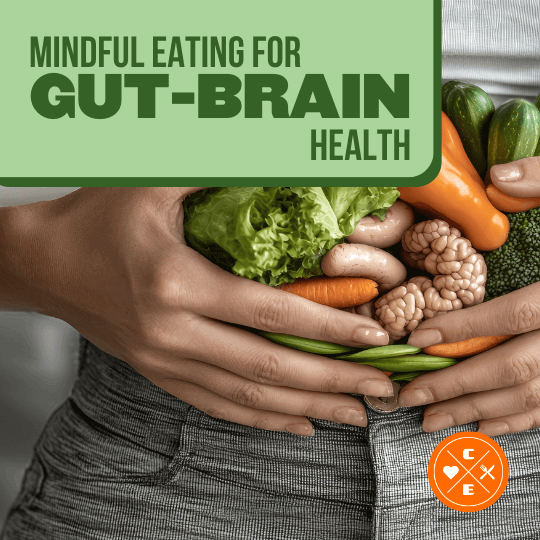
Mindful Eating for Gut-Brain Health
Jason Nista
Nutrition
|
Healthy Lifestyle
7 minute read
Table of Contents
Mindful eating can improve digestion, reduce stress, and strengthen the connection between your gut and brain. Here’s how it works:
- Focus on your meal: Avoid distractions like phones or TV.
- Engage your senses: Notice colors, smells, and textures of your food.
- Chew slowly: Take smaller bites and pause between them.
- Choose gut-friendly foods: Include probiotics (yogurt, kefir) and prebiotics (bananas, garlic) while avoiding processed foods and added sugars.
These simple changes promote better digestion, balance gut bacteria, and support mental well-being. Start by practicing mindful eating with one meal a day to experience these benefits.
Meal Planning For GUT HEALTH + MINDFUL EATING Tips ...
The Science of Gut-Brain Connection
Your gut and brain are in constant communication through neurons, hormones, and chemical signals. This network influences everything from digestion to your mood. Understanding this connection helps explain how mindful eating can strengthen this relationship.
Gut-Brain Communication System
The gut and brain communicate via several pathways, with the vagus nerve serving as a direct link. This nerve sends signals about hunger, fullness, and stress from your digestive system to your brain. Interestingly, your gut - sometimes called the "second brain" - contains about 100 million neurons and produces neurotransmitters, including nearly 90% of the body's serotonin. Practicing mindful eating can enhance these signals by lowering stress levels. Additionally, trillions of gut bacteria play a key role by producing neurotransmitters and supporting immune health.
Gut Health and Mental Well-Being
Research increasingly shows a strong link between gut health and mental health. When gut bacteria are balanced, they help regulate mood, improve sleep, boost stress tolerance, and enhance memory and focus. On the flip side, digestive imbalances are often linked to anxiety and depression, demonstrating how closely the gut and brain are connected.
Impact of Stress and Diet
Chronic stress and an unhealthy diet can upset gut bacteria, disrupt digestion, and cause inflammation. Processed foods loaded with sugar and artificial additives are particularly harmful to your gut microbiome. On the other hand, a diet rich in whole foods - especially those high in fiber and natural probiotics - supports gut health and brain function.
Balanced eating is key to maintaining the gut-brain connection. For example, Clean Eatz Kitchen offers portion-controlled meals designed to provide the nutrients your body needs while encouraging consistent, healthy eating habits.
How Mindful Eating Supports Gut-Brain Health
Mindful eating helps strengthen the connection between your gut and brain by reducing stress, improving digestion, and supporting a balanced gut microbiome. Let’s break down how it works.
Stress Relief Through Mindful Eating
Eating mindfully activates your body’s natural relaxation response, which can have a positive effect on gut health. It lowers cortisol levels - the stress hormone that can disrupt digestion and impact gut bacteria - by shifting your body into a calmer 'rest and digest' state. This practice can also help curb stress-related eating and ease digestive discomfort.
Clean Eatz Kitchen makes mindful eating easier with pre-portioned meals. By eliminating the hassle of meal planning and prep, you can focus entirely on the experience of eating.
Improved Digestion
Taking the time to eat mindfully encourages you to chew thoroughly and eat at a slower pace. This not only helps your body absorb nutrients more effectively but also reduces bloating by signaling fullness more accurately.
Supporting a Balanced Gut Microbiome
Mindful eating can contribute to a healthier gut by encouraging better food choices and improving digestion. When you eat with awareness, you're more likely to:
- Opt for whole, nutrient-rich foods that benefit gut bacteria
- Steer clear of processed foods that may harm gut flora
- Stick to consistent eating patterns that promote microbial diversity
- Pay attention to how specific foods make you feel
Studies indicate that mindful eating may be connected to greater gut microbiome diversity, which plays a key role in maintaining strong gut-brain communication and overall well-being.
sbb-itb-1989a25
Steps to Practice Mindful Eating
Using Your Senses While Eating
Turn your meal into a sensory experience. Start by noticing the colors, shapes, and textures of your food. Take a moment to enjoy its aroma before your first bite. As you chew, pay attention to how the flavors and textures change. For example, Clean Eatz Kitchen's pre-portioned meals are plated with colorful, nutrient-rich ingredients, making it easier to focus on the meal without distractions. Once you've engaged your senses, set aside anything that pulls your attention away.
Removing Mealtime Distractions
Creating a distraction-free space can help you focus on your food. Silence your phone, turn off electronics, and find a quiet spot to eat. These small changes can strengthen the connection between your brain and gut, helping you enjoy your meal more fully and recognize when you're satisfied.
Eating Slowly with Appreciation
Slowing down while eating helps your body recognize when you're full. Try setting your utensils down between bites to give yourself time to digest. Smaller bites and brief pauses let you fully enjoy the flavors and textures of your meal. With Clean Eatz Kitchen's pre-portioned meals, you can skip the prep and focus entirely on enjoying each bite mindfully.
Foods That Support Gut-Brain Health
Choosing the right foods can directly nourish the connection between your gut and brain, complementing mindful eating habits.
Probiotic and Prebiotic Foods
Adding foods rich in probiotics and prebiotics to your diet can help maintain a healthy gut microbiome. Fermented options like yogurt, kefir, and sauerkraut provide live probiotics that support gut health. Clean Eatz Kitchen offers meals that include these beneficial ingredients.
Prebiotic-rich foods, which feed the good bacteria in your gut, include:
- Oats and quinoa
- Sweet potatoes and Jerusalem artichokes
- Chickpeas and lentils
- Bananas
- Garlic and onions
Anti-Inflammatory Foods
Reducing inflammation is another key factor in supporting gut-brain health. Foods packed with omega-3 fatty acids and antioxidants can help lower inflammation, keeping this connection strong. Some great options are:
- Fatty fish like salmon, mackerel, and sardines
- Leafy greens such as spinach, kale, and collard greens
- Berries like blueberries, strawberries, and blackberries
- Extra virgin olive oil
- Nuts and seeds, especially walnuts and flaxseeds
- Spices like turmeric and ginger
Clean Eatz Kitchen regularly incorporates these ingredients into their meals, making it easier to include them in your diet.
Foods to Limit or Avoid
Just as important as what you eat is what you avoid. Certain foods can disrupt gut-brain health, so try to limit:
- Processed foods
- High-fructose corn syrup
- Refined carbs
- Excessive alcohol
- Artificial sweeteners
- Heavily processed vegetable oils
Instead, focus on whole, minimally processed foods that support your gut and brain. Clean Eatz Kitchen emphasizes clean, nutrient-rich ingredients in their meals to help you stay on track.
Pairing these food choices with mindful eating can strengthen the connection between your gut and brain even further.
Conclusion
Key Takeaways
Mindful eating can boost digestion, reduce stress, and support gut health. This connection between the gut and brain plays a crucial role in improving overall well-being.
Steps to Begin
Here’s how to start practicing mindful eating:
- Choose one meal a day to focus on eating mindfully.
- Eliminate distractions like phones or TV during meals.
- Pay attention to the colors, smells, and textures of your food.
- Pause between bites by setting down your utensils and chewing slowly.
If you’re looking for extra support, Clean Eatz Kitchen offers convenient meal options to help you along the way.
How Clean Eatz Kitchen Can Help
Clean Eatz Kitchen makes mindful eating easier with portion-controlled meals starting at $8.99. These meals, developed by registered dietitians and chefs, are designed to help you enjoy your food without the hassle.
"Our business is built around helping people live healthier lifestyles. All of our food comes in portion-controlled, balanced servings that will make eating healthier easier for you" [1].
Here’s what they offer:
- Expert-designed, nutritionally balanced meals
- Portion control for easier, stress-free eating
- Meal plans tailored to different dietary preferences
- Freshly prepared ingredients shipped within 3 days
- Meals that can be stored frozen for up to 12 months
Related Articles
How Fermented Foods Support Immune Health
5 minute read
How Prepared Meals Help Busy People Lose Weight
7 minute read
Top 7 High-Carb Meals for Muscle Gain
6 minute read

